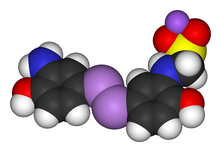This is an old revision of this page, as edited by CheMoBot (talk | contribs) at 08:53, 10 August 2011 (Updating {{chembox}} (no changed fields - added verified revid - updated 'DrugBank_Ref', 'UNII_Ref', 'ChEMBL_Ref', 'ChEBI_Ref', 'KEGG_Ref', 'ChEBI_Ref') per Chem/Drugbox validation (report [[Wiki). The present address (URL) is a permanent link to this revision, which may differ significantly from the current revision.
Revision as of 08:53, 10 August 2011 by CheMoBot (talk | contribs) (Updating {{chembox}} (no changed fields - added verified revid - updated 'DrugBank_Ref', 'UNII_Ref', 'ChEMBL_Ref', 'ChEBI_Ref', 'KEGG_Ref', 'ChEBI_Ref') per Chem/Drugbox validation (report [[Wiki)(diff) ← Previous revision | Latest revision (diff) | Newer revision → (diff)
| |

| |
| Names | |
|---|---|
| Other names Sodium 3,3'-diamino-4,4'-dihydroxyarsenobenzene-N-formaldehydesulfoxylate; Neoarsphenamine;914 | |
| Identifiers | |
| CAS Number | |
| 3D model (JSmol) | |
| ChemSpider | |
| ECHA InfoCard | 100.006.613 |
| PubChem CID | |
| UNII | |
| CompTox Dashboard (EPA) | |
InChI
| |
SMILES
| |
| Properties | |
| Chemical formula | C13H13As2N2NaO4S |
| Molar mass | 466.15 g/mol |
| Except where otherwise noted, data are given for materials in their standard state (at 25 °C , 100 kPa).
| |
Neosalvarsan is a synthetic chemotherapeutic that is an organoarsenic compound. It became available in 1912 and superseded the more toxic and less water-soluble salvarsan as an effective treatment for syphilis. Because both of these arsenicals carried considerable risk of side effects, they were replaced for this indication by penicillin in the 1940s.
Both salvarsan and neosalvarsan were developed in the laboratory of Paul Ehrlich in Frankfurt, Germany. Their discoveries were the result of the first organized team effort to optimize the biological activity of a lead compound through systematic chemical modifications. This scheme is the basis for most modern pharmaceutical research. Both salvarsan and neosalvarsan are prodrugs — that is, they are metabolised into the active drug in the body.
Structure
The structure of salvarsan, and of this derivative, was once believed to feature an As=As bond (as shown in the figure). In 2005, salvarsan was shown to be a mixture of the cyclic trimer and a pentamer. The revised structure features As-As single bonds, not double bonds.
References
- Strebhardt K, Ullrich A (2008). "Paul Ehrlich's magic bullet concept: 100 years of progress". Nat. Rev. Cancer. 8 (6): 473. doi:10.1038/nrc2394. PMID 18469827.
{{cite journal}}: Unknown parameter|month=ignored (help) - "accsnet.ne.jp". Archived from the original on 2007-06-07. Retrieved 2007-08-25.
- Lloyd NC, Morgan HW, Nicholson BK, Ronimus RS (2005). "The composition of Ehrlich's salvarsan: resolution of a century-old debate". Angewandte Chemie International Edition in English. 44 (6): 941–4. doi:10.1002/anie.200461471. PMID 15624113.
{{cite journal}}: CS1 maint: multiple names: authors list (link)